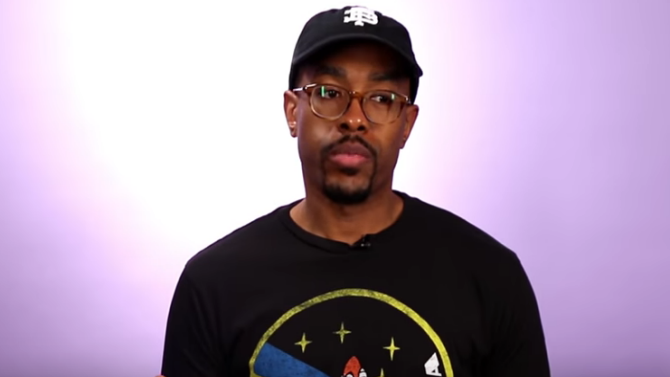[ad_1]

Scene from BuzzFeed’s “27 Questions Black People Have for Black People” video
YouTube screenshot
Along with being so remarkably tone-deaf that its tone deafness felt intentional, BuzzFeed’s now infamous “27 Questions Black People Have for Black People” actually raised more questions than it answered. Namely, who green-lit this? Were the people in the video actors reading from a script? Or did they come up with their own questions? And where do they find these types of anti-black black people in 2016? Living Social? In line at Qdoba? Working at Qdoba? Google Plus? And if they’re not found, where are they made? Where is this “I’m Just Not That Into Other Black People” factory located?
Also, of the 27 questions—which vacillated from “Eh” to “Are you f–king kidding me?”—which was the least terrible? And the most terrible?
(In order, from least to most terrible.)
27. If my dab is on fleek, am I lit?
26. Why is it so hard to be on time?
25. Why did watermelon become our thing? Like, everyone should love watermelon.
Interestingly enough, each of these questions came relatively early. And at this point, it still had the potential to be a funny and irreverent video. But instead of attempting to mine humor from some of the lighter questions and conditions associated with blackness, and perhaps draw on those absurdities, it veered heavy. And by “it veered heavy” I mean “it veered into an 8-foot-deep pond full of s–t.”
24. Why do black people look at your shoes before they greet you?
23. Why is my natural hair … seen as a political statement?
22. Why do you get upset when I don’t like a black celebrity?
21. Why is it a problem if I like anime?
20. Why do black people have to say, “I have Native American in my family,” to seem interesting?
We’ve officially reached the “Do these black people actually know any black people in real life?” section of these questions. Or perhaps the “These black people are actually addressing one specific black person who had a specific issue with them at some time in the past” part. Black parents, pay attention. This is what happens when you homeschool your children and the only contact they have with other blacks is through King magazine and syndicated episodes of Mad About Me.
19. Why is blackness only defined by adversity?
18. Why are we more likely to get engaged in the most recent dance trend than we are to be involved in politics or opening a business?
17. Why are we so quick to support a nonblack-owned business, but hesitate to support a black-owned business?
16. Why don’t we want to confront our mental-health issues?
15. Why is there a checklist for being black?
14. Is there a cutoff time for the whole homophobia thing in the black community, because I’m really looking forward to that.
13. Why do you not want to be seen as a monolith, but want to take someone’s black card away for not liking something that’s “supposedly” black?
12. Why do we call each other the n-word but get vehemently upset when a white person uses the n-word?
11. Why do you assume well-off black people don’t know what it’s like to be black?
Standing in the mirror and repeating each of these questions to yourself five times is step two on the 12-step “How to Be a Black Conservative” plan. (How do I know? I saw the DVD box set featured on Amazon Prime last week. It was coupled with a Black Klingon Jesus-signed copy of Gifted Hands.)
10. Do you really believe black is beautiful?
9. Or is that something you say just to sound cool?
8. Why do you think people with light skin look better than people with dark skin?
7. Why do some black people say, “You’re pretty for a dark-skinned girl”?
6. Why do some black men only date white women?
5. Why is it OK for a black man to date white women but not OK for a black woman to date outside of her race?
4. Why do I have to be mixed in order to have long hair?
In the right context, these are actually not terrible questions. Or, rather, the thinking behind the questions is actually not terrible. (The phrasing is pretty terrible, though. I desperately hope these weren’t scripted.) Colorism is a foundational and pervasive issue within black culture. And none of us are immune to it, even if the effect is subconscious. But “the right context” is not a nuance-adverse video on the same platform as listicles of walrus GIFs. Also, this conversation can not be had in a productive and meaningful way without a 50-foot neon sign with “ITS SLAVERY’S FAULT, MOTHERF–KERS!” in the backdrop. Indicting a black person for colorism without that very extremely f–king relevant context in mind is like going to a flood victim’s house and complaining that the carpet is wet.
3. Why do you chant “Black lives matter” then tear each other down in the next breath?
2. Why is being educated considered a white thing? Why can’t I love school and also be black?
1. Why is growing up without a father so common within our race?
And this is officially where the video went from “27 Questions Black People Have for Black People” to “27 Things Said by Black People at Trump Rallies.” Or perhaps “27 Topics Found on the Stormfront Home Page Today.”
What makes each of the fallacies present in these particular questions so dangerous is that 1) they draw from the worst stereotypes of black people 2) they can each easily–easily!!!–be proven to have no basis in reality and 3) the fact that they’re based on shitty stereotypes and can be so easily proved false usually means that the person repeating them has a sincere antipathy for black people.
Which brings me to the last question: Again, where is that damn factory?
[ad_2]





















